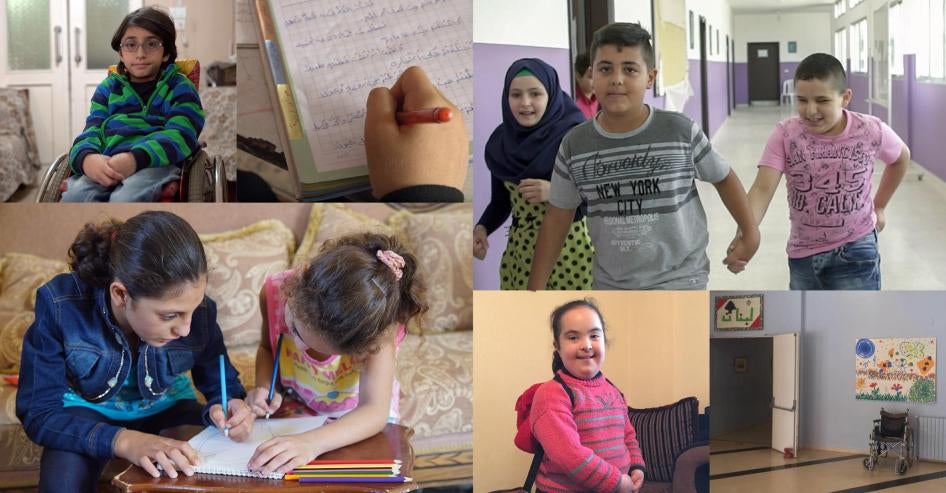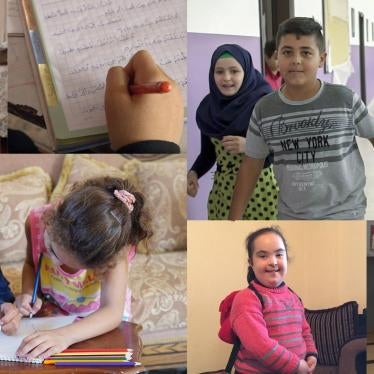Basmah, a 9-year-old girl from Akkar, starts her day like most Lebanese children, putting on a backpack as her siblings get ready for school. But Basmah isn’t going to school. She has Down Syndrome, and like thousands of children with disabilities in Lebanon, she isn’t getting an education.
Lebanon passed a law in 2000 that guaranteed the right to education for children with disabilities and barred schools from discriminating against them. But Basmah’s parents told us that their local public school denied her admission three years ago. The principal said Basmah “moved a lot” and couldn’t be in class with other children. She has never been to school.
The educational path of children with disabilities in Lebanon is strewn with logistical, social, and economic pitfalls that mean they often face a compromised school experience—if they can enroll at all. Discriminatory admissions practices are robbing Lebanese children of an education. And without any real options for a quality education, thousands of children with disabilities are being left behind.
There is no clear data on the number of children who have been denied an education in Lebanon, because the government does a poor job of keeping statistics on children with disabilities. But based on international estimates, Lebanon could have around 40,000 children ages 5 to 14—the country’s age for compulsory education—who have disabilities. They have the same right to education as all other children, without exception.
Human Rights Watch, is releasing a report this week documenting the barriers that children with disabilities across Lebanon face in getting an education. We found that schools routinely bar children with disabilities from admission, in violation of Lebanese and international law. And for those who manage to enroll, most schools do not take reasonable steps to provide them with a quality education alongside their peers. Few schools in Lebanon are physically accessible, and the government does little to provide the support that children may need to succeed.
Instead, many children with disabilities in Lebanon spend their days in government-subsidized institutions, which are not mandated to provide an education. And a lack of monitoring, poor evaluation mechanisms, and a dearth of appropriate resources raise serious concerns about whether these institutions fulfill the children’s right to an education.
And many children, like Basmah, stay home and receive no education at all.
There is no reason why children with disabilities should not be in mainstream schools alongside their peers. To end systematic discrimination and move toward education for all, Lebanon should adopt an inclusive education system, to enable children with disabilities to study in mainstream schools with reasonable support for academic and other forms of achievement. Inclusive education need not be costly, and benefits all children—not just those with disabilities—because it focuses on the diverse learning needs of all students and can lead to a higher quality education.
Lebanon has taken some steps in the right direction in recent years. The Education Ministry is planning a 2018 pilot program to include children with learning disabilities in 30 public schools and children with visual, hearing, physical, and intellectual disabilities in 6 schools. But this is still a far cry from what is needed and what Lebanese and international law require.
The Education Ministry should provide inclusive education in all its schools in a way that achieves maximum inclusion of children with disabilities in mainstream schools, including through adapting school curricula to cater to all learning needs in a classroom and through adequate teacher training. And the Ministry of Social Affairs should create and implement a time-bound plan to end the reliance on institutionalization of children with disabilities.
Denying children with disabilities the chance to go to school is a denial of their childhood and the chance to live independently, have a meaningful job, and be included in their communities.
Eighteen years after passing a law on the rights of people with disabilities, Lebanon needs to take serious and concrete steps to end discrimination in school admissions and ensure that all children can realize their right to a quality education.









